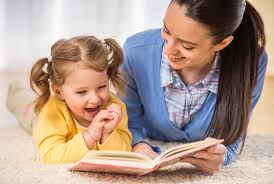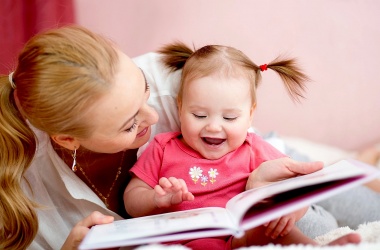Why would a child read

Reading is a load for the brain. By reading, we train it in the same way as we train our muscles by practicing sports. Scientists have long proved: people who read and live longer. What can we say about a small person who has just started to work actively in neurophysiological processes? He needs reading like air! And while the baby can’t read by himself, the help of his parents is invaluable here. What does reading out loud give children?
Speech Development
Children who are regularly read by their parents are more likely to speak before their peers, and their speech is richer. The fact is that in everyday life we use low-order vocabulary and grammar, often even simple words. Books also use a rich literary language, rich in a variety of speech turns. The uneasy grammar that is in the books helps children develop logic. Logic is necessary for proper thinking. And a formed speech is a formed thinking. Thanks to the books, a child not only draws new words, learns to pronounce and use them correctly, he also trains logical thinking.
Imagination development
Imagination and fantasy are the generators of new ideas and non-standard solutions. No cartoon can develop the imagination the way a book does. When a child listens to a fairy tale, he mentally draws a picture, imagines what the heroes and decorations look like. This is a kind of work, and completely independent. If children are offered a cartoon, they will not be able to be active participants: the action with all the details is already drawn for them. Children only have to be passive spectators.
Advertising self-reading
Any teacher will immediately identify reading children. They better understand the meaning of what they have read, correctly formulate their thoughts, logically build statements, write competently, and remember information better. It is worth to teach children to read from a diaper. It is not a question of early learning to read, but of reading out loud. Read alsohttps://argoprep.com/blog/improve-your-childs-reading-comprehension-level/
Offer your kids a book as a toy. Look at the pictures together, comment on them, say the sounds of animals or objects depicted on the pages, offer your child to turn the pages himself – this is a great exercise for the development of fine motor skills. If your child tears the pages, explain to him calmly that it is not worth doing this, and give him books with cardboard sheets.
Try not to abuse publications with buttons and sound signals, let the book remain a book, and the baby enjoys reading. In the future, the child himself will be drawn to literature. Do not forget to read it yourself in front of children. Choose a paper edition.
Training of listening
The skill of listening to information, i.e. listening, is now very much needed. First, many school exams test this skill (USE in particular). Secondly, it is simply necessary for harmonious learning of foreign languages. Thirdly, we are very often in contact with people, and we need to quickly and clearly understand what we hear. Thus, we need listening in everyday life. It is reading aloud fairy tales, poems and rhymes that gives the child the opportunity to “practice his ears.
Closeness to the parents
Every time parents read to a child, magic happens: consolidation and unity of the family. Children feel warmth and parental care. Listening to the speech of mom or dad, the child calms down, stress and fatigue is reduced during the day. The voice of parents helps to relax and sleep better. The elders, in their turn, also receive bright emotions from communication with children and literature. Together you live joyful moments of the plot, sympathize with the heroes, try to solve a difficult task and help the characters. Beautiful moments when you and your children travel together, without leaving home.
Solving many problems
Reading a fairy tale out loud can help you “talk” to your child, especially if you feel that they have problems that they are silent about. Often, the child starts to tell you what he is worried about when he meets a similar situation in the fairy tale. Even if he doesn’t talk about the problem, he will hear from the story the way it is solved. You can also discuss the right and wrong actions of the heroes, it will be clearer than any parental guidance, how to do it and not to do it.
When and what to start reading to children

Start reading your baby before it’s even born. It is proven that the voice of the mother soothes the baby in the womb. After birth, continue reading to him. Read in order to lull the baby. A little later, read and show the illustrations.
In six months, the baby will be happy to listen to small simple works based on rhymes or repetitions. These include “Repka”, “Cock, golden scallop” and other funny things. In a year a child can be offered short fairy tales, works by Korney Chukovsky, poems by Agniya Barto. Closer to two you can move on to longer fairy tales by Vladimir Suteyev or Eduard Uspensky. Starting from three years old, it is possible to significantly expand the children’s home library, complementing it with long fairy tales or large works, divided into chapters. These are works by Sergey Kozlov, Vitaly Bianka, Sofia Prokofieva and other famous writers.
Choose fairy tales taking into account the interests of your child. Let your library be diverse. Be sure to pay attention to the illustrations. They should be colorful, contrasting and of high quality. Try to choose books that match the text and illustrations on the spread. If a child can not sit and listen to a fairy tale calmly, give him the opportunity to change his position, eat and so on. Do not stifle his movements: pre-school children are not successful due to their psychophysical development.
Read the same fairy tale as many times as the child asks – this is his comfort zone. Perhaps, with its help he is working on some situation, or maybe he just really likes the illustrations. Do not deprive him of positive emotions. Do not impose on the child your choice of fairy tale, leave it to him.
How to read to children
This should be done thoughtfully and measured, your reading should not be formal. Give yourself to the process with all your heart, put meaning into your speech. Read by imitating different voices and intonations. Let the sound even be hypertrophic and slightly grotesque. Accentuate the key moments, slow down and accelerate, sometimes switching to whispering. Sometimes stop on purpose, distract yourself by closing the book, and ask your child to remind you what you read and where you stopped. Stress the sounds that your child has difficulty pronouncing.
Try to discuss the illustrations and be sure to talk about what you have read. Ask the child’s opinion about the fairy tale, heroes, actions. Ask what he would do in this or that situation. Let the reading be your family daily ritual. Read to your child before going to bed or when it is necessary to calm him a little. Try not to reject the child when he asks you to read. And let the book be the best gift for your children!